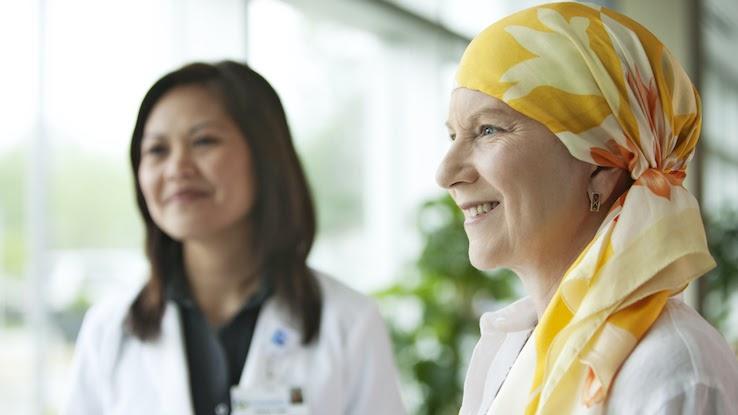Stuff You Should Know How Mustard Works

Cancer develops due to the uncontrollable growth of harmful cells or a tumor in the body. Types of cancer can differ based on the region where they abound in a person's body or the blazon of actual systems that are afflicted by that growth. Many people who are diagnosed with cancer are advised to undergo chemotherapy to treat the illness.
Approximately 650,000 patients with cancer receive outpatient chemotherapy in the U.Due south. each year. This type of treatment tin can exist very effective in eliminating or stopping the spread of cancer, but it does have some risks to consider as well. Larn the basics about chemotherapy, including how it works, what to expect when undergoing treatment and the potential side effects to consider.
What Is Chemotherapy?
Chemotherapy, oft referred to simply as "chemo," is the use of specific types of medication to treat cancer. At that place are more than 100 chemotherapy drugs bachelor that tin be used individually or in dissimilar combinations to treat various types of cancer. These medications are developed to specifically target cells that are rapidly dividing and multiplying; some medications change the harmful cancer cells' DNA, while others rely on blocking the chemical signaling that controls jail cell segmentation. Depending on the specific mechanism of action, these drugs piece of work past stopping or slowing the growth of cancer cells or by actually destroying the dividing cells.
Chemotherapy is different from radiation therapy and surgery in that chemotherapy affects a person's entire torso, while radiation and surgery affect merely the area of the body where the cancer is located. In many cases, chemotherapy is combined with surgery or radiation therapy to treat cancer. Chemotherapy can besides treat bone marrow diseases and immune organisation disorders.
Following a cancer diagnosis, chemotherapy can be used for several purposes:
- Treating cancer: Sometimes chemo can destroy cancer cells to the point that cancer can no longer exist detected in a patient's body. In many cases, the cancer cells won't grow dorsum once the handling has reached this point.
- Controlling cancer: Chemo can also be utilized to stop or irksome the spread of cancer to other parts of the body or impale cancer cells that have already spread.
- Easing cancer symptoms: Chemo can shrink tumors that are causing pain or pressure. This is as well known equally palliative care.
What to Wait When Undergoing Chemotherapy
The specifics of your chemotherapy treatment will depend on the healthcare professional person you're working with, the type and severity of the cancer yous have and the types of medications your health insurance covers, among other factors. You may receive your handling at home, in a dispensary, in a hospital or in a healthcare professional's office. While some patients receive treatments daily, others only demand them weekly or monthly. However, near professionals conform for their patients to receive handling in cycles to allow for periods when their bodies have time to rebuild healthy cells.
In that location are several ways doctors can administer chemotherapy drugs. Ask about these dissimilar options if you accept concerns well-nigh how you'll receive your treatments:
- Oral: You lot may accept the medications past mouth in pill, capsule or liquid class.
- Topical: The drug is administered on your skin as a cream, gel or ointment.
- Continuous infusions: This procedure involves the utilize of an electronic 4 pump that administers the drugs over a period of one to seven days.
- Injections: The drugs may be injected into certain areas (the spinal culvert, a muscle, an avenue, etc.) to treat a more specific area of your body.
- Catheter: This involves inserting a catheter into your forearm or hand, and the chemotherapy drugs are injected into the catheter through a syringe. The catheter can exist placed each time a treatment takes place. However, you might also accept a central venous catheter temporarily placed in your chest or upper arm for piece of cake admission at each handling. This process tin can take just a few minutes.
- Iv infusion: This is similar to a catheter except that the drugs are mixed into a solution and administered through tubing fastened to the catheter. This takes betwixt 30 minutes and a few hours to complete.
Potential Side Effects of Chemotherapy
Many of the side effects chemotherapy causes are a result of the drugs affecting your entire body (including healthy cells) in addition to the areas the cancer is affecting. Some vulnerable areas that are oftentimes affected by chemotherapy include the oral fissure, intestines, cells responsible for hair growth and bone marrow.
The post-obit are some potential side effects of chemotherapy:
- Loss of appetite
- Nausea or airsickness
- Easy bruising
- Fatigue
- Hair loss
- Anemia
- Fever
- Mouth sores
- Pain
- Diarrhea or constipation
Your healthcare provider can assist you find ways to manage or alleviate these side furnishings if yous feel them. For case, certain dietary changes can help with diarrhea, and many people choose to buy wigs and scarves to cover their heads after experiencing hair loss.
Possible Health Risks of Chemotherapy
In addition to the side effects that may arise because of chemotherapy treatments, there are also a few possible long-term wellness risks that may appear during or after completion of your handling. These risks include:
- Weakened immunity and increased run a risk of infection
- Infertility
- Eye problems
- Kidney problems
- Nerve damage
- Damage to lung tissue
- Risk of getting another type of cancer
Chemotherapy does come up with risks, but it has likewise saved thousands of lives. It's of import to consult with your healthcare provider most the pros and cons of chemo handling, learn how the drugs volition be administered and ask about ways to manage possible side effects.
Resource Links:
https://www.cancer.gov/about-cancer/handling/types/chemotherapy
https://www.cancer.org/handling/treatments-and-side-effects/treatment-types/chemotherapy.html
https://medlineplus.gov/cancerchemotherapy.html
https://www.mayoclinic.org/tests-procedures/chemotherapy/well-nigh/pac-20385033
https://world wide web.cdc.gov/cancer/preventinfections/patients.htm
Source: https://www.symptomfind.com/health/chemotherapy?utm_content=params%3Ao%3D740013%26ad%3DdirN%26qo%3DserpIndex
0 Response to "Stuff You Should Know How Mustard Works"
Post a Comment